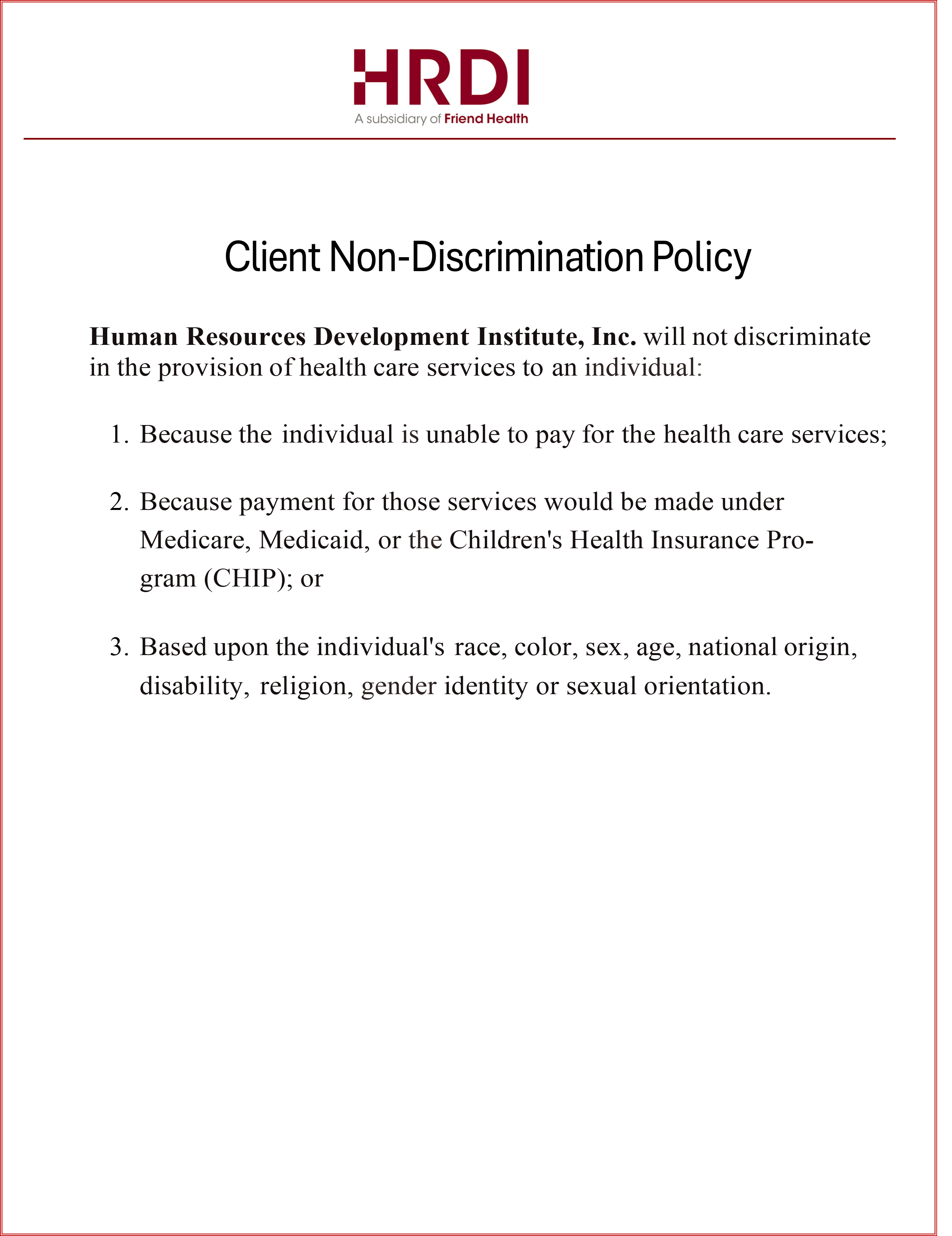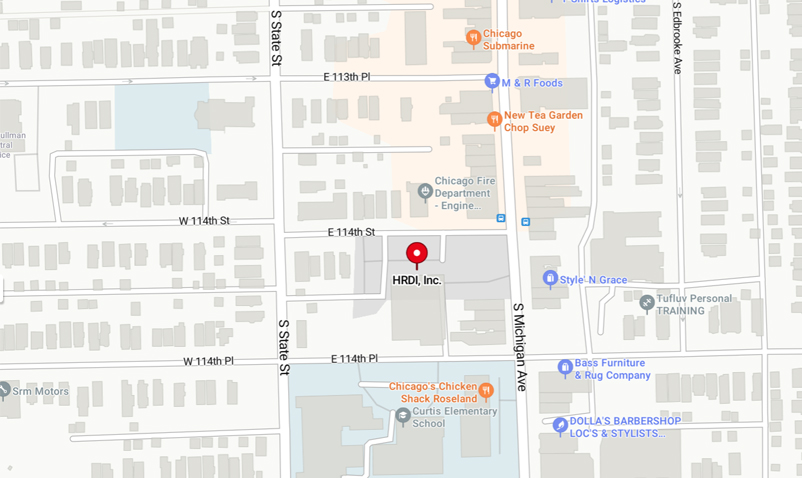Client Right and Privacy Policy
Your health record contains personal information about you and your health. Protected Health Information ("PHI") is information about you, including demographic information, that may identify you and that relates to your past, present, or future, physical, mental, or behavioral health condition and related health care services.
On line Privacy Statement
 HRDI is committed to the confidentiality and privacy of your personal information. We do not sell, distribute or otherwise disclose your personal information to third parties of any kind.
HRDI is committed to the confidentiality and privacy of your personal information. We do not sell, distribute or otherwise disclose your personal information to third parties of any kind.
Notice of Client Rights & Privacy Policy Under the Health Insurance Portability and Accountability ACT (HIPAA) of 1966.
HRDI is committed to protecting the privacy and confidentiality of your records. This notice has been prepared in response to federal and state regulations that enforce HIPAA. The regulations contain legal requirements regarding how we at HRDI must protect your health and service records.
This notice describes how medical, mental health, and social service information about you may be used and disclosed, and how you can get access to this information. Please review this notice carefully. A copy of this notice will be provided to all clients receiving services at HRDI.
How We May Use and Disclose Your Health Information
 For Treatment: Your PHI may be used and disclosed by your physician, counselor, program staff and others outside of our program who are involved in your care for the purpose of providing, coordinating, or managing your health care treatment and any related services. This includes coordination or management of your health care with a third party, consultation with other health care providers or referral to another provider for health care treatment. For example, your protected health information may be provided to the state agency that referred you to our program to ensure that you are participating in treatment. In addition, we may disclose your protected health information from time-to-time to another physician or health care provider (e.g., a specialist or laboratory) who, at the request of the program, becomes involved in your care. Except for emergency services, we will not send your PHI to an outside health care provider who is caring for you unless you give us written authorization to do so.
For Treatment: Your PHI may be used and disclosed by your physician, counselor, program staff and others outside of our program who are involved in your care for the purpose of providing, coordinating, or managing your health care treatment and any related services. This includes coordination or management of your health care with a third party, consultation with other health care providers or referral to another provider for health care treatment. For example, your protected health information may be provided to the state agency that referred you to our program to ensure that you are participating in treatment. In addition, we may disclose your protected health information from time-to-time to another physician or health care provider (e.g., a specialist or laboratory) who, at the request of the program, becomes involved in your care. Except for emergency services, we will not send your PHI to an outside health care provider who is caring for you unless you give us written authorization to do so.
For Payment: Examples of payment-related activities are: making a determination of eligibility or coverage for insurance benefits, processing claims with your insurance company, reviewing services provided to you to determine medical necessity, or undertaking utilization review activities. If you are in a substance abuse treatment program, we will not use your PHI to obtain payment for your health care services without your written authorization. If you are in a mental health program, we may use your PHI to obtain payment for your health care services without your written authorization.
For Health Care Operations: We may use or disclose, as needed, your PHI in order to support the business activities of our program including, but not limited to, quality assessment/assurance/ improvement activities, employee review activities, training of students, licensing, accreditation, and conducting or arranging for other business activities. For example, we may use a sign-in sheet at the registration desk where you will be asked to sign your name and indicate your physician or counselor. We may also call you by name in the waiting room when it is time to be seen. We may share your PHI with third parties that perform various business activities (e.g., billing or typing services) for HRDI provided we have a written contract with the business that prohibits it from re-disclosing your PHI and requires it to safeguard the privacy of your PHI.
With Authorization: We must obtain written authorization from you for other uses and disclosures of your PHI. In general, other uses and disclosures of your PHI will be made only with your written authorization. You may revoke this authorization at any time, unless the program or its staff has taken an action in reliance on the authorization of the use or disclosure you permitted.
Other Uses and Disclosures That Do Not Require Your Authorization
 Required by Law: We may use or disclose your PHI to the extent that the use or disclosure is required by law, made in compliance with the law, and limited to the relevant requirements of the law. You will be notified, as required by law, of any such uses or disclosures. Under the law, we must make disclosures of your PHI to you upon your request. In addition, we must make disclosures to the Secretary of the Department of Health and Human Services for the purpose of investigating or determining our compliance with the requirements of the Privacy Rule.
Required by Law: We may use or disclose your PHI to the extent that the use or disclosure is required by law, made in compliance with the law, and limited to the relevant requirements of the law. You will be notified, as required by law, of any such uses or disclosures. Under the law, we must make disclosures of your PHI to you upon your request. In addition, we must make disclosures to the Secretary of the Department of Health and Human Services for the purpose of investigating or determining our compliance with the requirements of the Privacy Rule.
Health Oversight: We may disclose PHI to a health oversight agency for activities authorized by law, such as audits, investigations, and inspections. Oversight agencies seeking this information include government agencies and organizations that provide financial assistance to the program peer review organizations performing utilization and quality control.
Medical Emergencies: We may use or disclose your PHI in a medical emergency situation to medical personnel only. Our staff will try to provide you a copy of this notice as soon as reasonably practicable after the resolution of the emergency.
Child and Elder Abuse or Neglect: We may disclose your PHI to a state or local agency that is authorized by law to receive reports of child and elder abuse or neglect. However, the information we disclose is limited to only that information which is necessary to make the initial mandated report.
Deceased Patients: We may disclose PHI regarding deceased patients for the purpose of determining the cause of death, in connection with laws requiring the collection of death or other vital statistics, or permitting inquiry into the cause of death.
Research: If you are in a substance abuse treatment or behavioral health program, we may only disclose PHI to researchers if (a) an Institutional Review Board reviews and approves the research and a waiver to the authorization requirement; (b) the researchers establish protocols to ensure the privacy of your PHI; (c) the researchers agree to maintain the security of your PHI in accordance with applicable laws and regulations; and (d) the researchers agree not to re-disclose your protected health information except back to HRDI.
Criminal Activity on Program Premises/Against Program Personnel: We may disclose your PHI to law enforcement officials if you have committed a crime on program premises or against program personnel.
Court Order: We may disclose your PHI if the court issues an appropriate order and follows required procedures.
Interagency Disclosures: Limited PHI may be disclosed for the purpose of coordinating services among government and community based programs that provide mental and/or behavioral health services where those programs have entered into an interagency agreement.
Public Safety: If you are in a mental health treatment program only, we may disclose PHI to avert a serious threat to health or safety, such as physical or mental injury being inflicted on you or someone else.
Your Rights Regarding Your PHI
Right of Access to Inspect and Copy: You have the right, which may be restricted in certain circumstances, to inspect and copy PHI that may be used to make decisions about your care. We may charge a reasonable, cost-based fee for copies.
Right to Amend: If you feel that the PHI we have about you is incorrect or incomplete, you may ask us to amend the information although we are not required to agree to the amendment.
Right to an Accounting of Disclosures: You have the right to request an accounting of the disclosures that we make of your PHI. We may charge you a reasonable fee if you request more than one accounting in any 12-month period.
Right to Request Restrictions: You have the right to request a restriction or limitation on the use of your PHI for treatment, payment, or health care operations. We are not required to agree to your request.
Right to Request Confidential Communication: You have the right to request that we communicate with you about medical matters in a certain way or at an appropriate location.
Right to File a Complaint: You have the right to file a complaint in writing to us or to Equip for Equality or the Illinois Guardianship and Advocacy Commission (please see below) if you believe we have violated your privacy rights.
Right to a Copy of this Notice: You have the right to a copy of this notice.
Rights of the Person’s Served
 HRDI is committed to following all laws and regulations that benefit the rights of the consumer. This list in not intended to be a complete list of all of your rights but a summary of the rights available to you. As a consumer of the Human Resource Development Institute Inc., you have the following rights:
HRDI is committed to following all laws and regulations that benefit the rights of the consumer. This list in not intended to be a complete list of all of your rights but a summary of the rights available to you. As a consumer of the Human Resource Development Institute Inc., you have the following rights:
1. You have the same legal rights as any other person within the State of Illinois and the United States.
2. Your access to services will not be denied on the basis of race, religion, ethnicity, disability, sexual orientation, or HIV status.
3. Your services will be provided in the least restrictive environment available.
4. You have the right to be treated with dignity and respect by the HRDI Personnel.
5. You have the right to a reasonable privacy.
6. You have the right to a safe and comfortable environment.
7. You have the right to be fully informed about the HRDI diagnostic and treatment procedures, their purposes, their anticipated outcomes, and any risk from the procedures of the programs.
8. You have the right to refuse to participate in any residential or outpatient activity or prescribed treatment; however, the HRDI treatment staff reserve the right to discontinue your treatment should your refusal to participate make responsible and reasonable treatment impossible.
9. You have the right to review you client records (charts) under the Supervision of a HRDI clinical treatment staff member who can interpret the specific record accurately. A request to review your records must be made by you to the Program Supervisor and Clinical Director.
10. You have the right to confidentiality of your medical information.
11. You have the right to examine and have an explanation of your bill. You may speak to the Program Supervisor for that information.
12. You have the right to be free from abuse, neglect, humiliation, and financial exploitation.
13. You have the right to be free from any form of restraint or seclusion used as a means of coercion, discipline, or retaliation
14. You have the right to have HRDI find an interpreter for you if you do not speak English.
15. You have the right to lodge complaints and appeals regarding services, agency staff, or the agency as an entity without retaliation or discontinuation of service. You have the right to the following agency wide Consumer Complaint Procedures”.
CONSUMER COMPLAINT PROCEDURE
HRDI is committed to addressing consumer needs and concerns and encourages consumers to notify use whenever they have a complaint about service. If you have a service complaint, you can formally inform HRDI of your complaint by using HRDI’s Consumer Complaint Procedure. We will use our best efforts to resolve your complaint, and if we are unable to resolve your complaint or your complaint requires further attention, we will assist you contacting the appropriate outside agency that will work to find a solution to your problem.
Please note that making a complaint will not result in any retaliation or a barrier to service.
To make a formal complaint:
You are encouraged to first notify your assigned primary service provider (counselor, case manager, clinician) that you have a complaint. Your assigned primary service provider will request that you explain the circumstances surrounding your complaint, and will work to resolve your complaint.
If your primary service provider is unable to resolve your complaint to your satisfaction or your complaint involves your primary service provider, you should then request to speak to the Program Supervisor. The Program Supervisor will request that you explain the circumstance surround your complaint, and will then work to resolve your complaint.
If the situation is still not resolved to your satisfaction after speaking with the Program Supervisor or the complaint involves the Program Supervisor, you can make a formal written complaint to HRDI’s Medical Director. Ask any staff member for a Consumer Complaint Form. The staff member will be responsible for sending your Consumer Complaint Form to HRDI’s Medical Director. The staff member is also responsible for providing you with a copy of the completed Consumer Complaint Form.
The Medical Director will review your Consumer Complaint Form and provide you with a written response detailing the actions that HRDI will take to address your complaint. You should receive a response from the Medical Director within 3-5 business days, depending on the nature and urgency of your complaint.
If the complaint is resolved, no further action will be necessary. However, if the complaint warrants further attention, the final resource available is a review with a external advocacy and rights organization.
Access to Advocacy and Rights Organizations
The violation of HIPAA by HRDI is a crime. If you suspect a violation you may file a report to the appropriate authorities in accordance with applicable law, including:
Equip for Equality
20 North Michigan Avenue, Suite 300 Chicago, Illinois 60602
(800) 537-2632
Guardianship and Advocacy Commission Legal Advocacy Service
P.O. Box 7009 Hines, Illinois 60141-7009
(866) 274-8023
Department of Human Services
401 South Clinton Street Chicago, Illinois 60601
(800) 843-6154
Department of Children and Family Services
100 West Randolph Street, 6th Floor Chicago, Illinois 60601
(312) 814-4650
Illinois Office of Inspector General
160 North LaSalle Chicago, Illinois 60601
(800) 368-1463
The U.S. Department of Health and Human Services
200 Independence Avenue, S.W.
Washington, D.C. 20201
Toll Free: (877) 696-6775
You can request a written copy of this notice by contacting HRDI at (773) 966-0333. HRDI reserves the right to change the terms of this policy and will make reasonable efforts to notify service recipients of any changes to this policy.
Sliding Fee Discount Policy



